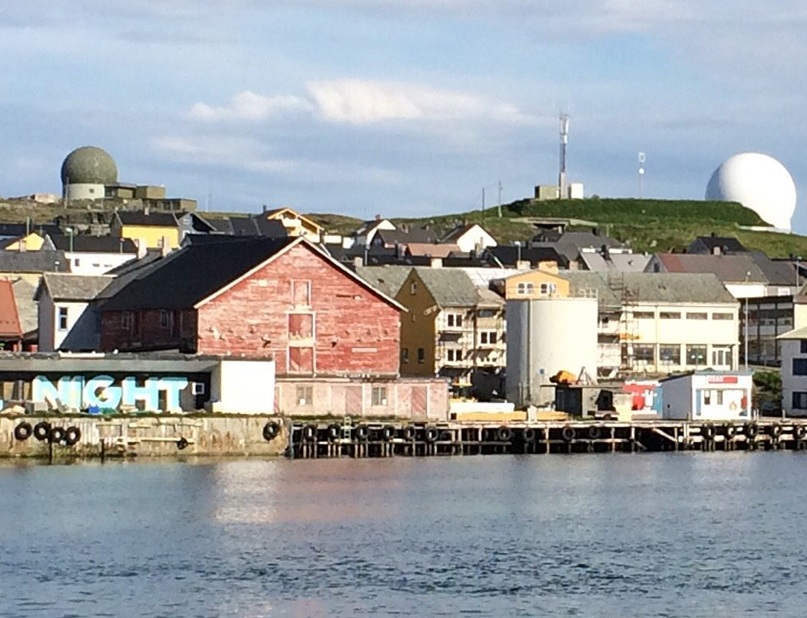The Russian Orthodox outpost in Norway
In 2017, the parish priest of the Svjato-Onežskij cathedral on the Russian Arctic coast began negotiations with the Norwegian mayor of Vardø to build a Russian Orthodox chapel on the fishing island. But when the plans included an imposing 17-metre-high building in the middle of NATO's large radar installations, the city council refused to grant permission despite generous Russian offers of subsidies.
Oslo (AsiaNews) - The island of Vardø is located in northern Norway, stretching out into the Barents Sea, with a charming fishing village where about two thousand people live, including 40 of Russian nationality.
The first thing you see when you approach the island are huge white spheres, NATO radars, standing on the hill like giant mushrooms. The Norwegian services use them for cosmic monitoring and surveillance of Russian Arctic airspace, which extends right to the borders of Vardø.
On a clear day, you can see the Kola Peninsula, separated from Norway by the Varanger Fjord. Gadžievo, home to Russia's nuclear submarine fleet, is located 150 kilometres east of the island.
Relations between Russia and Norway have a long history dating back to the founding of Kievan Rus' by the Scandinavian Varangians, and trade negotiations took place on this island to exchange flour and birch tar for fish and salt, as continued until the Second World War.
After the end of the Soviet Union and the Cold War, relations had become much closer, and today the Kremlin is actively seeking to use the trust of local residents to gain the trust and support of the inhabitants of northern Norway.
As documented by an investigation by Novaya Gazeta Evropa, since 2011, a seemingly innocuous initiative has been proposed: “historical memory trips” to places where Russian soldiers entered during the war against the Nazis, spreading narratives favourable to Russia among Norwegians.
Northerners are in fact very unhappy with Oslo's policies and feel that Russia takes better care of their needs. Since 2017, the Orthodox priest of the Svjato-Onežskij cathedral on the Russian Arctic coast, Father Aleksandr Koptev, has also been active, initiating negotiations with the mayor of Vardø to build a Russian Orthodox chapel on the island to ‘promote relations with the local population’, whom the priest visited regularly, meeting with local Russians.
Father Aleksandr is a former military man, like many Russian Orthodox priests who were left without work at the end of the Soviet period, and in the 1980s he had served in the northernmost districts, such as the northern fleet airfield located in the Arkhangelsk region, from which special military aircraft took off, dedicated to maritime surveillance and radio-electronic warfare.
In 1997, he was ordained a priest, serving the diocese of Kargopolsk, led by Bishop Aleksandr (Zajtsev), one of the most ardent supporters of the Russian war in Ukraine, who often travelled to Vardø with Koptev to bless the monuments to Norwegian partisans, with Orthodox crosses placed beside them.
The Patriarch of Moscow, Kirill, blessed the initiative for the Russian chapel, which Bishop Zajtsev wanted to place at the point closest to the radio location stations, stating that “the place was shown to me by God himself”.
The pandemic slowed down the completion of the project, which had not been contested by the local authorities and involved a small chapel that could serve as a reference point for Russian sailors arriving on the island.
However, when the plans were revealed, showing an imposing 17-metre-high building, the city council refused to grant permission, despite considerable pressure from Russia with generous offers of rewards and subsidies.
With the outbreak of war in Ukraine, the reason for Russia's eagerness became clear: they intended to use the church to assert their presence next to a crucial NATO settlement.
The opening of the “great chapel” would have marked the beginning of an uninterrupted procession of Russian ecclesiastical delegations, organised by the Ministry of Defence headed by Orthodox subdeacon Andrej Belousov, to interfere with Western radars and further support pro-Russian propaganda, with the argument that “Western sanctions do not correspond to the interests of the population of northern Norway”, one of Father Aleksandr's favourite topics in his sermons.
11/08/2017 20:05







.png)










